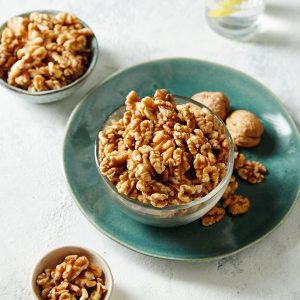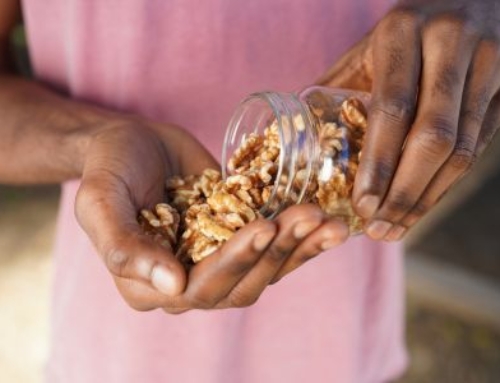The Top Food for Promoting Good Mood for Men
Guest blog from nutrition therapist Ian Marber
Nutrition has an undoubted role to play in maintaining and supporting every aspect of our health, and so including plenty of nutrient-dense foods in the daily diet offers many potential benefits. New and ongoing research suggests certain nutrients, individual foods and eating patterns might be linked with mood disorders and could play a supporting role in mental well-being.
Five top food for promoting good mood specifically for men
- Walnuts
 Walnuts are a notable source of key nutrients that support a range of functions, from heart health to mood, but on a more practical level, they are versatile, portable and easy to find in shops. As one of the best plant food sources of omega-3s[1], they are the only tree nut that is an excellent source of ALA.
Walnuts are a notable source of key nutrients that support a range of functions, from heart health to mood, but on a more practical level, they are versatile, portable and easy to find in shops. As one of the best plant food sources of omega-3s[1], they are the only tree nut that is an excellent source of ALA.
A study published in Nutrients found that walnut consumption may help improve mood in men. Non-depressed healthy, young men showed a 27% reduction in overall mood disturbances after eating a walnut-enriched diet.[2]
As well as being enjoyed as a snack, walnuts can be enjoyed in many recipes. Click here for walnuts recipe inspiration >>> https://www.californiawalnuts.co.uk/recipe-database/
- Oats

Oats are a source of minerals including iron, magnesium and manganese as well as zinc, an essential mineral that is found throughout the body, with the highest amount in regions of the brain.
A growing body of evidence suggests that zinc deficiency may be a factor underlying depressive symptoms and other mood dysfunction (e.g., anxiety, irritability) in some cases.[3]
Oats can be enjoyed in many different ways but we recommend trying our Walnut, Cinnamon and Apple Porridge >>> https://www.californiawalnuts.co.uk/recipes/walnut-cinnamon-and-apple-porridge/
- Spinach
 Spinach is a go-to green vegetable as it is rich in vitamins A, C and K as well as magnesium and manganese. Spinach is a notable source of folate, which is the naturally occurring form of folic acid, found in supplements.
Spinach is a go-to green vegetable as it is rich in vitamins A, C and K as well as magnesium and manganese. Spinach is a notable source of folate, which is the naturally occurring form of folic acid, found in supplements.
Folate is a B-vitamin that is required by the body to carry out many processes for normal health. Low folate status has been linked to depression, with some studies suggesting nearly 30% of severely depressed patients have folate deficiency.
Achieving adequate folate intakes may improve clinical outcomes in certain mental health conditions.[4]
Try including spinach in your breakfast with this Paprika & California Walnut Scrambled Egg Bagel >>> https://www.californiawalnuts.co.uk/recipes/paprika-california-walnut-scrambled-egg-bagel/
- Berries
 All berries are a good source of polyphenols, and so including raspberries, strawberries and blackberries in the diet is a tasty way to benefit from a variety of polyphenols. But you may want to favour blueberries as they contain twice as many polyphenols than the others.
All berries are a good source of polyphenols, and so including raspberries, strawberries and blackberries in the diet is a tasty way to benefit from a variety of polyphenols. But you may want to favour blueberries as they contain twice as many polyphenols than the others.
Polyphenols are plant compounds that may play a role in a variety of diseases and health outcomes. As causative factors for major mood disorders are thought to be inflammation, autoimmune tissue damage and prolonged psychological stress, there is an accumulating body of evidence suggesting neuroprotection and reduced risk of depression when dietary polyphenols are included in the diet.[5]
For a berry boost, why not try this Walnut, Berry and Beetroot Smoothie Bowl >>> https://www.californiawalnuts.co.uk/recipes/walnut-berry-and-beetroot-smoothie-bowl/
- Mediterranean Diet
 Many of the overall benefits of a healthy diet can be encapsulated by what is termed the ‘Mediterranean diet’. This way of eating offers an abundance of nutrients ranging from vitamin A to zinc, via fibre and polyphenols too. Research shows that following the Mediterranean diet can help offset some mood disorders too.
Many of the overall benefits of a healthy diet can be encapsulated by what is termed the ‘Mediterranean diet’. This way of eating offers an abundance of nutrients ranging from vitamin A to zinc, via fibre and polyphenols too. Research shows that following the Mediterranean diet can help offset some mood disorders too.
In fact, following a Mediterranean diet showed a 32% reduction in the risk of depression. The Mediterranean diet is characterised by high intake of vegetables, fruits, cereals, pulses, and nuts – including walnuts.[6]
For the taste of the Mediterranean, why not try our Grilled Sea Bass with Walnut Greek Salsa recipe >> https://www.californiawalnuts.co.uk/recipes/grilled-sea-bass-with-walnut-greek-salsa/






